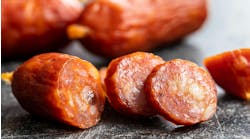Sports nutrition refers to a broad interdisciplinary field involving dietitians, biochemists and exercise physiologists. The purpose is to apply nutrition knowledge to practical eating plans to provide fuel for physical activity, to facilitate repair and rebuilding processes in the body, and to promote overall health and wellness. Common sports nutrition products are ready-to-drink beverages, protein bars and powders, and dietary supplements.
Athletes and bodybuilders have remained the major end users of the global sports nutrition market for several years. However, on account of rapid urbanization, hectic and sedentary lifestyles, and the growing prevalence of lifestyle diseases, such as obesity and diabetes, people are seeking more active lifestyles.
The global sports nutrition market was valued at $50.8 billion in 2018 by Statista. The market research firm projects it will reach $81.5 billion by 2023.
“Younger consumers are the primary audience for sports nutrition products, and with Gen Z and Millennials expressing great interest in products that meet their individual needs or tastes, it is no surprise to see further segmentation of the sports category,” says Lu Ann Williams, director of innovation, Innova Market Insights.
Global launches of sports nutrition products more than doubled between 2015 and 2019, and suppliers are now segmenting their offerings to meet the varied needs and interests of customers, according to Innova Market Insights. There are three particularly strong development trends: plant-powered products, clean-label innovation and greater personalization.
Pea protein was used in 32% of plant-based launches in 2019, followed by rice protein (21%). There is room for alternatives, with ongoing experimentation with more unusual options such as fava bean, microalgae and pumpkin seed proteins, according to Innova.
“Sports nutrition came to the clean-label party a little later than many areas of food and drink but is now increasingly focused on this issue,” says Williams. “Around a third of launches in 2019 carried clean-label claims, up from just 20% in 2015. No additives/preservatives claims are also particularly important, having doubled penetration over the same period.”
To give you an idea of some of the sport nutrition markets available, we've spotlighted a few below.
Kombucha Isotonic
Buoy Hydration and M Kombucha have partnered up to offer Beyond Hydration, an electrolyte-dense functional kombucha flavored with fresh, organic cold-pressed grapefruit and ginger. The beverage features Buoy Hydration’s formula of low-sodium, natural sea salts, including 87 micronutrients and trace minerals. It includes fair trade black and green teas, kombucha culture and fair trade evaporated cane sugar, which is needed for kombucha fermentation. It also contains a range of better-for-you ingredients, including acacia fiber, which functions as a prebiotic to increase beneficial bacteria.
Clean-label Powders
The new Orgain Organic Sport line of plant-based powders comes in three unique formulations. The protein powder includes branched-chain amino acids to support muscle growth and reduce soreness, plus tart cherry powder and fermented turmeric powder to provide anti-inflammatory benefits. The energy powder includes organic beets, which are known for their energizing and anti-inflammatory properties, along with caffeine from green coffee beans and adaptogens to help support endurance and physical performance. The recovery powder includes apple cider vinegar for electrolyte replenishment and adaptogens to help reduce stress.
With the Young Athlete in Mind
PepsiCo recently rolled out Gatorade Juiced, a blend of real fruit juices and electrolytes. Touted as the only juice-based sports drink on the market with no added sugar, no artificial sweeteners or flavors and no colors from artificial sources, Gatorade Juiced made its debut in Apple Raspberry, Citrus Berry Punch and Mixed Berry flavors. Gatorade Juiced offers 160mg of sodium and 50mg of potassium for hydration, along with 7g of sugar and 40 calories per serving. A six-pack of 12-oz. bottles retails for about $4.79.


